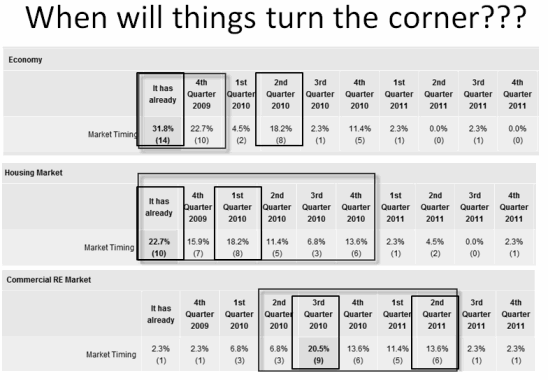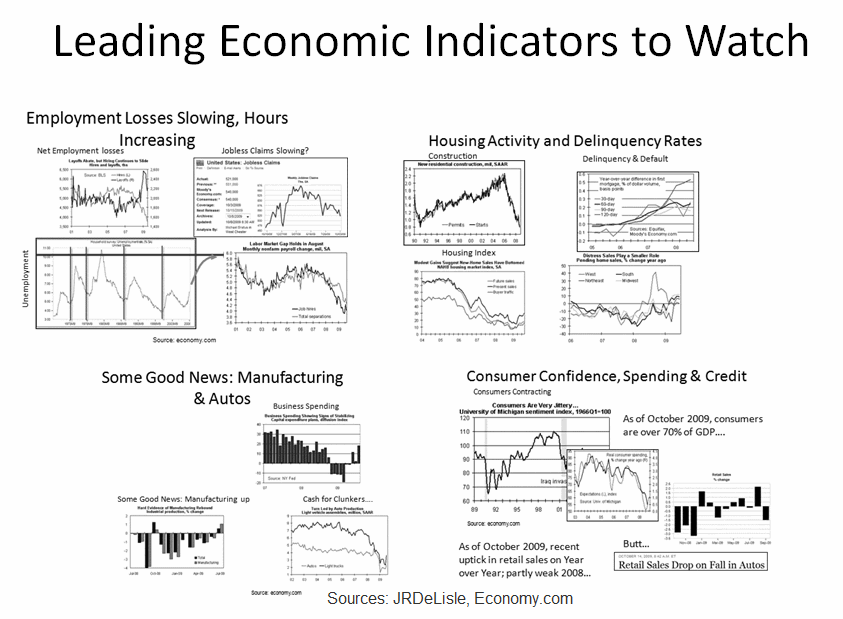|
Question Topic: Market Timing and Recovery. When do you think things will turn the corner for the economy and for real estate markets? How will we know we turned the corner and what do we look out for so we know when it's here?
DrD's Answer
That is one of the leading questions on real estate professionals' minds and, unfortunately, one for which there is no clear answer. That said, it is useful to try to frame a general response and point out some of the signals that should be watched. I'll take a stab at both elements of your quesiton: market cycles and market timing.
Market Timing: Survey Responses
To get a general sense of where we are in the cycle, I have asked respondents to several of my recent surveys to indicate when they think we will experience a bottoming out for the economy, housing market and commercial real estate market. As noted in Illustration 1, many thought the economy had already turned or would in the 4th quarter of the year. The opinions on the housing market were much more divided, with responses ranging from "it already has" turned, to it will turn in the 4th quarter of 2010. As to the commercial real estate market, the responses are also divided, with many believing the bottom of the commercial market is at least a year off.
Illustration 1: Market Timing

My Take on Market Timing
In late October, we heard that some 80% of economists believe the economy has turned the corner, and that we are on the road to recovery. While this will be great news if it holds up, I believe it is on the "glass is half full" side of the equation and am not ready to declare we've passed the inflection point in the cycle. I attribute my somewhat pessimistic attitude to my behavioral bent which argues that a recovery depends on the belief and expectations of businesses and consumers. While there are some positive indicators and news here and there, I don't get a sense of widespread acceptance of the recovery scenario. Thus, while things may be getting better in a technical sense, from a more pragmatic sense that translates to hiring and spending, we won't likely feel like we're in a sustainable recovery for another six months or so. Even then, there is significant downside risk and prospects for a flat and rocky road to recovery.
While many are arguing the housing market has turned the corner, the fact the responses were so spread out (i.e., a platykurtic curve for those quant types among you) is suggestive of the uncertainty surrounding the sector. While the $8,000 first time homebuyer and 4.5% incentive programs are drawing some back into the game, rising delinquencies and foreclosures that are outpacing workouts remains troubling. Weak job prospects and lagging consumer confidence are likely to re-emerge as drags on the sector once the stimuli programs have burned off.
The commercial real estate outlook is another story of the excesses wrought from easy credit and risk management by transfer. I agree with the respondents on the two points they make in their responses. First, there is significant uncertainty about the timing of a bottoming out and thus recovery. Second, the commercial sector will likely lag the residential and the broader economy. Having lived through the late 80's and early 90's, I am a bear on the commercial market. Although the negative press is beginning to accelerate and catch the attention in Washington, what we've seen so far is merely the tip of the proverbial iceberg. Unfortunately, the problems are so deep and frozen into the system, even global warming won't help accelerate the process; some projects are going to be underwater for a long time and others may never rise above the sinking tide.
What to Do?
Okay, so I've been the bear again. Nothing new as I was predicting this over two years ago. That just goes to show you that if you hold your line and wait long enough, every once in awhile you'll look like a sage. Unfortunately, it wasn't just patience, but the inability to predict the event or trigger that would knock the stars out of alignment for the commercial sector. Well, the combination of the housing debacle that started the process of outing the excesses in market pricing was one of the triggers, following on the heals of an economic contraction, both of which are still being played out. So, my advice is to try to stay up on the market and watch for some of the key indicators I highlighted in Illustration 2: employment, housing, manufacturing and consumers. Once you're tracking them more closely, try to figure out when the upticks are real and sustainable vs. just more bouncing around. Good luck and stay on the defensive.
Illustration 2: Key Indicators to Watch

For back-up data and more detailed commentary, see my Annotated NAIOP Forum Presentation: We Ain't There Yet, and Their Ain't No Net. For a more Seattle-specific version of this discussion, see: Annotated WASCAR Presentation: To Walk, To Talk, or to Walk the Talk. Gool luck in navigating these troubled waters. |

